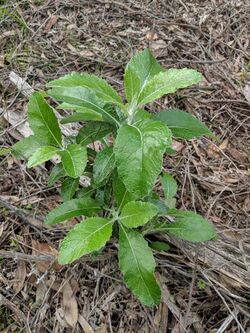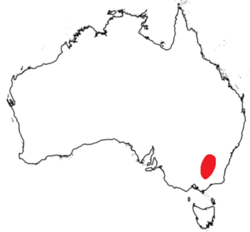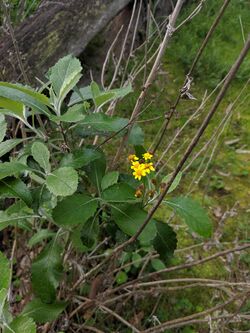Biology:Senecio garlandii
| Woolly ragwort | |
|---|---|

| |
| Scientific classification | |
| Kingdom: | Plantae |
| Clade: | Tracheophytes |
| Clade: | Angiosperms |
| Clade: | Eudicots |
| Clade: | Asterids |
| Order: | Asterales |
| Family: | Asteraceae |
| Genus: | Senecio |
| Species: | S. garlandii
|
| Binomial name | |
| Senecio garlandii (F.Muell. ex Belcher) [1]
| |

| |
| Distribution of Senecio garlandii | |
Senecio garlandii, commonly known as woolly ragwort, is a species of daisy native to southern New South Wales and north-eastern Victoria.[2]
Description
Senecio garlandii is an erect, perennial shrub that grows to a height of 1.2 metres (3 ft 11 in). The stems and lower leaf surface are densely covered with white, cottony hairs, whilst the leaves grow to 15 cm long and 8 cm wide, with toothed edges. The leaves are stalkless, and clasp the stem. The numerous small flower heads are clustered in sprays, and mature into light brown fruits that are grooved and covered with slender white hairs.[3][4][5]
Distribution and habitat
The species occurs in dry schlerophyll forests and open woodlands, on the sheltered south and east facing slopes of rocky outcrops between Wyalong, NSW to Chiltern, Victoria.[3][4] The species is capable of regenerating in both the absence and presence of fire, however fire facilitates germination and some resprouting occurs after fire.[3]

Conservation status
Australia
Woolly ragwort was previously listed under the EPBC Act as Vulnerable, but was removed in 2013 after it was reassessed by the Threatened Species Scientific Committee.[3]
NSW
The species is listed as Vulnerable in NSW under the Biodiversity Conservation Act 2016.[4]
VIC
The species is listed as Critically Endangered in Victoria under the Flora and Fauna Guarantee Act 1988.[6]
Conservation actions
Woolly ragwort occurs in several protected areas, including The Rock Nature Reserve,[7] Tabletop Nature Reserve, Benambra National Park and Ulandra Nature Reserve in NSW,[3] and in the Chiltern-Mt Pilot National Park in Victoria.[8]
References
- ↑ "Senecio garlandii F.Muell. ex Belcher.". Atlas of Living Australia. https://bie.ala.org.au/species/http://id.biodiversity.org.au/node/apni/2910938.
- ↑ "Senecio garlandii — Woolly Ragwort". Department of Environment and Energy. http://www.environment.gov.au/cgi-bin/sprat/public/publicspecies.pl?taxon_id=11366.
- ↑ 3.0 3.1 3.2 3.3 3.4 "Senecio garlandii (woolly ragwort) Listing Advice". Threatened Species Scientific Committee. Government of Australia. December 2010. http://www.environment.gov.au/biodiversity/threatened/species/pubs/11366-listing-advice.pdf.
- ↑ 4.0 4.1 4.2 "Woolly Ragwort - profile". NSW National Parks & Wildlife Service. https://www.environment.nsw.gov.au/threatenedSpeciesApp/profile.aspx?id=10750.
- ↑ Harden, G.J. (1992) Flora of New South Wales (Vol. 3), New South Wales University Press, Kensington, New South Wales, ISBN:0 86840 172 2
- ↑ "Senecio garlandii F.Muell. ex Belcher". Royal Botanic Gardens Victoria. https://vicflora.rbg.vic.gov.au/flora/taxon/c81123bc-bd4c-440b-bfba-c0841234f21a.
- ↑ The Rock Nature Reserve: Plan of management (PDF). Government of New South Wales. February 2000. ISBN 0-7313-6984-X. https://www.environment.nsw.gov.au/-/media/OEH/Corporate-Site/Documents/Parks-reserves-and-protected-areas/Parks-plans-of-management/the-rock-nature-reserve-plan-of-management-000098.pdf. Retrieved 29 July 2019.
- ↑ Chiltern – Mt Pilot National Park Management Plan (PDF). Government of New South Wales. October 2008. ISBN 9780731183814. https://parkweb.vic.gov.au/__data/assets/pdf_file/0020/313256/Chiltern-Mt-Pilot-National-Park-Management-Plan.pdf. Retrieved 29 July 2019.
Wikidata ☰ Q15601252 entry
 |

